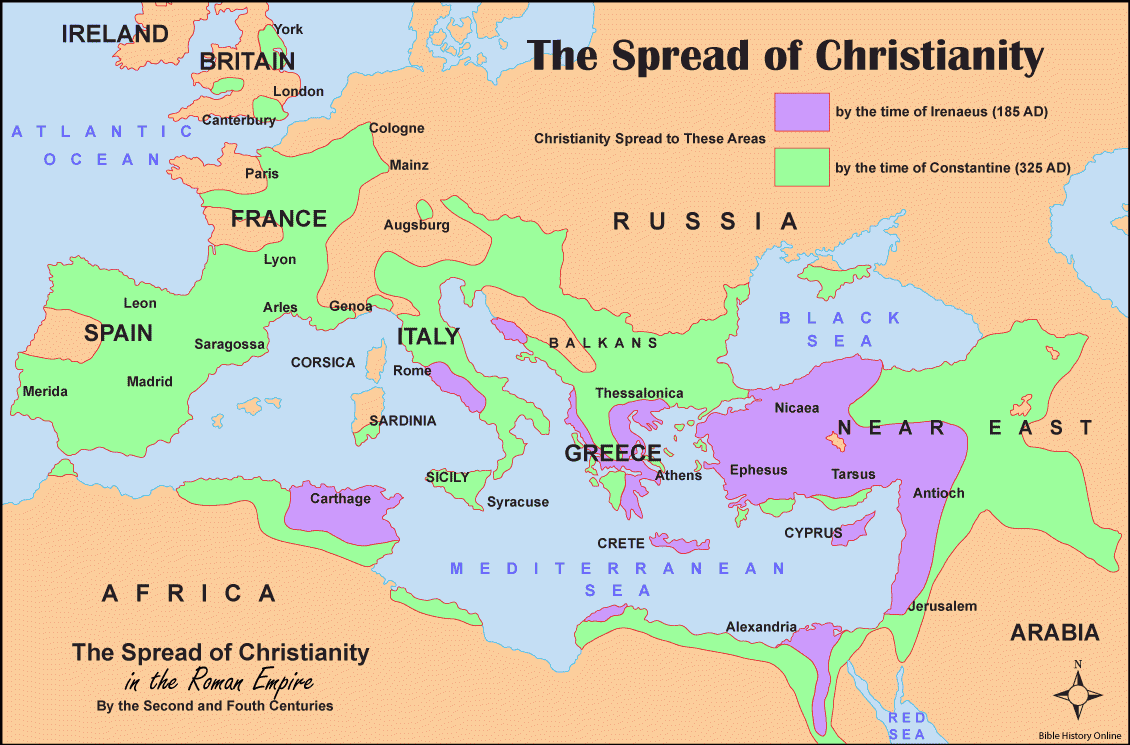Why Christianity Spread So Quickly in the Roman Empire
Christianity emerged in the first century AD and within a few centuries had become the dominant religion of the Roman Empire. Several factors contributed to its rapid rise and success in spreading its message throughout the empire.
The Christian Ideology Offered Hope and Community
Christians believed in a redemptive God who loved humanity unconditionally. This differed starkly from pagan religions which focused more on ritual ceremonies to appease indifferent gods. Christianity emphasized concepts like compassion, generosity, forgiveness and the inherent worth of every person regardless of social status. The early Christian communities provided stability and fellowship for their members. They cared for the poor, sick, widows and orphans—acts of charity that were highly unusual in the individualistic Roman society. This ethos of mutual support and belonging was deeply appealing, especially to those on the fringes of Roman society.
Offering Hope to the Dispossessed
Life was difficult and precarious for most common citizens in the Roman Empire. Poverty, illness and early death were widespread realities with little social safety nets. Slaves had virtually no rights or protections. Christianity offered the hope of divine justice, salvation and eternal life to those suffering in the present world. Its egalitarian message that “all are equal in Christ” gave dignity to the lowest classes.

Providing Social Support Networks
The Christian communities functioned as “collective care networks” where members looked after one another’s material and spiritual needs. They provided financial aid, healthcare, orphanages, refugees shelters and more. This filled crucial social gaps at a time when the imperial state offered little welfare. Their acts of selfless love and service deeply impressed contemporary observers and attracted many converts.
Christianity Adapted to Roman Cultural Norms
To spread successfully, Christianity needed to relate its message intelligibly within the Greco-Roman cultural milieu. Some of its tenets and practices were adapted accordingly.
Adopting the Organization of Greco-Roman Associations
Early Christian communities organized themselves along the lines of existing voluntary associations (collegia) that were popular in the cities. They elected presbyters and deacons to lead worship and manage communal affairs. Orderly institutional structures made Christianity coherent, approachable and administratively efficient—a model Romans could understand.
Using Greco-Roman Philosophical Concepts
Christian theologians like Paul and the Church Fathers presented Christianity’s message by drawing on familiar Stoic, Platonic and Neoplatonic philosophical frameworks. They interpreted Christian doctrines in terms the educated Roman elite would grasp, like using Logos to describe Christ. This intellectual calibration helped Christianity gain acceptance as a legitimate philosophy or “way of wisdom.”
Accommodating Existing Cultural Practices
Syncretism through cultural assimilation was commonly practiced in the polytheistic Roman world and early Christianity also engaged in it to some degree. They incorporated pagan festivals and rituals into their own liturgies to ease new converts’ transition. Over time, Christianity transformed and gave new meanings to such practices. This gradualist adaptation facilitated Christianity’s acceptance across the empire.
Christianity Emancipated Women and Gained Their Support
In sharp contrast to their subordinate status in Roman society, Christianity treated women as full moral agents and included them in leadership positions. Many women were attracted to the new opportunities and teachings.
Liberating Women through Leadership Roles
Prominent Christian women like Phoebe, a deaconess mentioned in Romans 16, held positions of spiritual authority in the early churches. Widows also played important social and administrative functions. Christianity thus empowered women and gave them careers radically denied to them elsewhere in the Greco-Roman world.
Appealing to Women through Inclusive Theology
Christianity taught that all people, regardless of attributes assigned by humanity like gender or social class, were equal before God. Salvation depended on faith alone rather than such superficial markers. Its affirming message resonated deeply with Roman women seeking dignity and purpose beyond their narrowly prescribed cultural roles.
Inheriting Wealth through female converts
Wealthy Roman women who converted were able to bequeath their fortunes to the Christian churches in their wills. As more elite women joined, Christianity gained significant financial assets to fuel its missionary expansion across the empire through the third century AD and beyond. The support of these influential female patrons proved invaluable for the movement’s success.
Christianity’s Adaptability and Appeal drove further Expansion
Christianity’s versatility in relating its core teachings to different audiences while maintaining doctrinal integrity was a key factor why it continued spreading prolifically throughout the late Roman period.
Missionary Outreach beyond Cities
Once established in urban centers, Christian missionaries actively brought the gospel to rural communities through itinerant preaching. They adapted their message and ministries to rustic contexts, gaining converts in the countryside. Mobile mission extended Christianity’s reach empire-wide rapidly within just a few generations.
Translation empowered Wider Propagation
Church fathers like Jerome spearheaded ambitious projects to translate Scripture and texts into local dialects like Latin, Coptic and Syriac early on. Accessible translations helped spread Christianity among the illiterate masses who spoke diverse indigenous languages across the empire but not Koine Greek or Latin.
Contextualization retained Converts
Local leaders inculturated Christianity appropriately based on each region’s cultural ways. For example, Celtic Christianity retained elements of pre-Christian cosmology and calendar. Congruence between the gospel and peoples’ worldviews aided conversion retention. Christianity proved not a foreign import but took root organically in varied contexts as a localized tradition.
Its proven resilience and adaptability in continually engaging new audiences and environments through the ages remains a key reason for Christianity’s continued growth and influence worldwide today. The early Church’s receptiveness to cultural diversity and change seeded a rich multicultural harvest of faith traditions across the globe.
